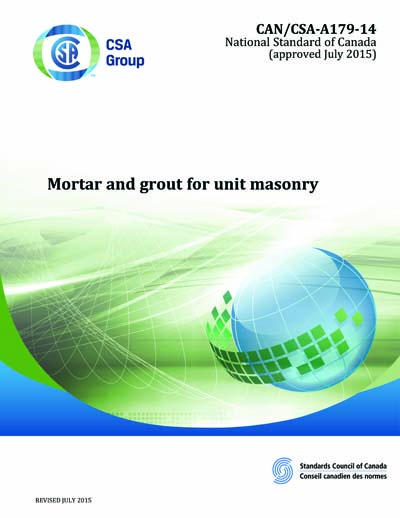Most recent
CAN/CSA A179-14 (R2019)
Mortar and grout for unit masonry
Preface This is the fourth edition of CSA A179, Mortar and grout for unit masonry. It supersedes the previous editions published in 2004, 1994, and 1976. The changes in this edition include the following: a) adding Portland-limestone cement and blended hydraulic cement as acceptable cementitious materials for masonry mortars and grouts; b) adding requirements for self-consolidating grout; c) referencing ASTM C979 as the required standard for colouring pigments; d) removing the reference to ASTM C1357 and adding reference to ASTM C1072 for the measurement of masonry flexural bond strength; e) revising Annex A, "Selection of mortar types"; and f) adding Annex D, "Repair mortars for older, traditional masonry". This Standard has been developed in compliance with Standards Council of Canada requirements for National Standards of Canada. It has been published as a National Standard of Canada by CSA Group Scope 1.1 General This Standard specifies requirements for a) mortar for use in bedding, jointing, and bonding of masonry units; and b) grout for use in filling core, cell, or cavity space in unit masonry construction. Notes: 1) The term "unit masonry" refers to masonry construction using clay (shale), calcium silicate (sand-lime), or concrete masonry units, with individual units not more than 200 mm high and 400 mm long, and not less than 75 mm thick. For other masonry units, the proportions of ingredients and any additives to be used in the mortar for masonry construction should be based on laboratory or field experience with the mortar ingredients and the particular masonry units to be used. 2) It is not the intent of this Standard to imply that all unit masonry constructed with mortar containing only conventional ingredients mixed conventionally will satisfy the design strengths in CSA S304 or the minimum bond requirements of Clause 9.1.1 of this Standard. When mortar bond is a concern, and the mortar considered for use satisfies the requirements of this Standard, the manufacturer of the unit should be contacted to provide independent laboratory data or to certify adequate bond with the mortar. Alternatively, when reasonable assurances of performance cannot be so obtained, mortar bond tests may be carried out under expected field conditions, before commencement of work, in accordance with ASTM C1072 or CSA S304. 1.2 Classification This standard specifies requirements for a) two types of mortar, Type N and Type S; and b) two types of grout, fine and coarse. Note: Annexes A and D provide guidance on selecting and specifying mortar types for new masonry construction, as well as other types of mortar which are often used for restoring older, traditional masonry but are not recognized by CSA S304 for use in modern engineered masonry. 1.3 Terminology In this Standard, "shall" is used to express a requirement, i.e., a provision that the user is obliged to satisfy in order to comply with the Standard; "should" is used to express a recommendation or that which is advised but not required; and "may" is used to express an option or that which is permissible within the limits of the Standard. Notes accompanying clauses do not include requirements or alternative requirements; the purpose of a note accompanying a clause is to separate from the text explanatory or informative material. Notes to tables and figures are considered part of the table or figure and may be written as requirements. Annexes are designated normative (mandatory) or informative (non-mandatory) to define their application.
CSA America, Inc. [csa]

